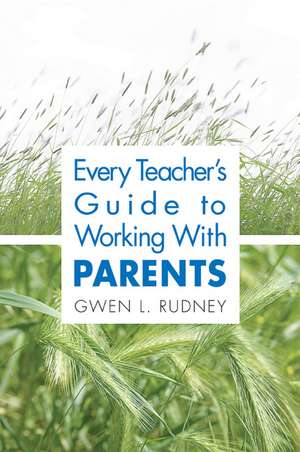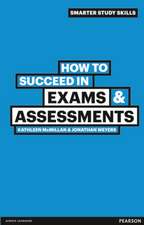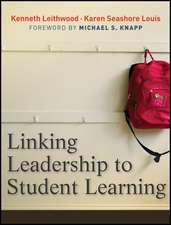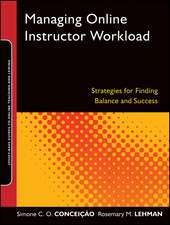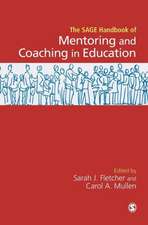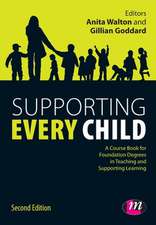Every Teacher's Guide to Working With Parents
Autor Gwen L. Rudneyen Limba Engleză Paperback – 28 sep 2005
Straightforward chapters offer teachers theory, practice, case studies, workshop exercises, and common sense strategies and reminders for working with parents to improve life and learning for all children.
| Toate formatele și edițiile | Preț | Express |
|---|---|---|
| Paperback (1) | 160.44 lei 3-5 săpt. | +8.19 lei 7-13 zile |
| SAGE Publications – 28 sep 2005 | 160.44 lei 3-5 săpt. | +8.19 lei 7-13 zile |
| Hardback (1) | 463.90 lei 6-8 săpt. | |
| SAGE Publications – 28 sep 2005 | 463.90 lei 6-8 săpt. |
Preț: 160.44 lei
Nou
Puncte Express: 241
Preț estimativ în valută:
30.70€ • 32.05$ • 25.41£
30.70€ • 32.05$ • 25.41£
Carte disponibilă
Livrare economică 14-28 martie
Livrare express 28 februarie-06 martie pentru 18.18 lei
Preluare comenzi: 021 569.72.76
Specificații
ISBN-13: 9781412917759
ISBN-10: 1412917751
Pagini: 128
Dimensiuni: 152 x 229 x 9 mm
Greutate: 0.21 kg
Ediția:New.
Editura: SAGE Publications
Colecția Corwin
Locul publicării:Thousand Oaks, United States
ISBN-10: 1412917751
Pagini: 128
Dimensiuni: 152 x 229 x 9 mm
Greutate: 0.21 kg
Ediția:New.
Editura: SAGE Publications
Colecția Corwin
Locul publicării:Thousand Oaks, United States
Recenzii
“Gives educators strategies to help involve, influence, and become partners with parents. This book will be an asset to all teachers, especially beginning teachers in training, new teachers, and teachers who mentor other teachers. All teachers can be reminded of the important role we play in a family’s life.”
“Teachers can easily use the strategies to be more effective communicators. Most importantly, the entire book is discussing a problem that all teachers have. .. We all have unique circumstances, but we all want the best for the students. How we do this is creating an effective plan that works for each individual child. This book’s strategies make it seem possible.”
“As I was reading it, I found things I could use in my next parent conference…The tone and style of the book really appealed to me. It was a fast read because it was so practical and useful. I wanted to keep reading to see what good information would come next."
“A practical and valuable tool to teachers and parents."
“I will be recommending this book to my principal for staff in-service training…. I think all teachers should read this as a great refresher on working with parents. I highlighted pieces of information on almost every page."
“Parent user–friendly...not overloaded with professional jargon.”
“Teachers can easily use the strategies to be more effective communicators. Most importantly, the entire book is discussing a problem that all teachers have. .. We all have unique circumstances, but we all want the best for the students. How we do this is creating an effective plan that works for each individual child. This book’s strategies make it seem possible.”
“As I was reading it, I found things I could use in my next parent conference…The tone and style of the book really appealed to me. It was a fast read because it was so practical and useful. I wanted to keep reading to see what good information would come next."
“A practical and valuable tool to teachers and parents."
“I will be recommending this book to my principal for staff in-service training…. I think all teachers should read this as a great refresher on working with parents. I highlighted pieces of information on almost every page."
“Parent user–friendly...not overloaded with professional jargon.”
Cuprins
Preface
Acknowledgments
About the Author
1. Understanding the Lives of Parents: Why Do They Do Those Things They Do?
Scenario: "If the Parents Would Just..."
Demands and Decisions
What Experts Have to Say
Quick Tips on Important Issues
Popular Literature
A Theoretical Look at Parenting Styles
So, What's the Problem?
What's a Parent to Do?
Avoid Extremes
Focus on the Target Goals of Parenting
Try Hard...and Keep Trying
The Kids Have a Role
Children Grow and Change
Parents Change and Develop Too
Helping Parents Who Have Special Struggles
Troubled Parents
Parents With Troubled Kids
Parents Love Their Kids
Additional Resources
Books
Web Sites
2. Collaborating With Parents: How Can Teachers Build Relationships That Work?
Scenario: "Is It Going to Matter?"
Understanding Complementary Spheres of Knowledge and Influence
What Do Teachers Mean When They Say They Want Support?
What Do Parents Want From Teachers?
What Qualities in a Teacher Are Most Important to Parents?
What Positive and Negative Experiences With Teachers Do Parents Remember?
What Do Parents Do When a Child Dislikes the Teacher?
What Do Parents Do When They Disagree With the Teacher?
Professionalism...in a Personal Way
Working With Parents: Key Strategies for Teachers
Greet Parents With Respect and Interest in Their Children
Solicit and Utilize Parent Questions, Advice, and Comments
Think About Homework
Develop "We-ness"
Be Prepared With Interesting, Meaningful Information
Be Honest...and Patient
Be Professional...in a Personal Way
Ask Not What the Parents Can Do for You but What You Can Do for the Parents
Coping With Difficult Parents...or Parents With Difficulties
Sometimes It's a Difficult Situation
Sometimes It's the Parent
Sometimes It's the Student
And Sometimes It's the Teacher
Conclusion
Additional Resources
Books
Web Sites
3. Advocating for Parents: What Are Powerful Messages We Can Share?
Scenario: "I Didn't Know How to Say It"
Message One: All of Us Have Parents...and Most of Us Become Them
The Problem With Ethnocentrism: Like Me/Not Like Me Thinking
The Problem With Assumptions
A Gentle Reminder
Message Two: Many Powerful Factors Create Misconceptions About Parenting
Remembering the Past
Media Influences
Habits of Mind
The Real Deal
Message Three: Most Parents Are Good Enough
Children's Health and Happiness
Time and Attention
Encouraging Learning
When There Are Problems
Message Four: Successful Families Come in Different Shapes and Sizes
Moms and Dads
Single Parents
Stepparents
What the Children Want
Message Five: It Really Does Take a Village to Raise a Child
Members of the Village
What the Village Can Do
Message Six: Schools That Advocate for Families Reap Multiple Rewards
Attitude and Atmosphere
Buildings and Bridges
Communication, Collaboration, and Competence
Parting Words
Additional Resources
Books
Web Sites
References
Index
Acknowledgments
About the Author
1. Understanding the Lives of Parents: Why Do They Do Those Things They Do?
Scenario: "If the Parents Would Just..."
Demands and Decisions
What Experts Have to Say
Quick Tips on Important Issues
Popular Literature
A Theoretical Look at Parenting Styles
So, What's the Problem?
What's a Parent to Do?
Avoid Extremes
Focus on the Target Goals of Parenting
Try Hard...and Keep Trying
The Kids Have a Role
Children Grow and Change
Parents Change and Develop Too
Helping Parents Who Have Special Struggles
Troubled Parents
Parents With Troubled Kids
Parents Love Their Kids
Additional Resources
Books
Web Sites
2. Collaborating With Parents: How Can Teachers Build Relationships That Work?
Scenario: "Is It Going to Matter?"
Understanding Complementary Spheres of Knowledge and Influence
What Do Teachers Mean When They Say They Want Support?
What Do Parents Want From Teachers?
What Qualities in a Teacher Are Most Important to Parents?
What Positive and Negative Experiences With Teachers Do Parents Remember?
What Do Parents Do When a Child Dislikes the Teacher?
What Do Parents Do When They Disagree With the Teacher?
Professionalism...in a Personal Way
Working With Parents: Key Strategies for Teachers
Greet Parents With Respect and Interest in Their Children
Solicit and Utilize Parent Questions, Advice, and Comments
Think About Homework
Develop "We-ness"
Be Prepared With Interesting, Meaningful Information
Be Honest...and Patient
Be Professional...in a Personal Way
Ask Not What the Parents Can Do for You but What You Can Do for the Parents
Coping With Difficult Parents...or Parents With Difficulties
Sometimes It's a Difficult Situation
Sometimes It's the Parent
Sometimes It's the Student
And Sometimes It's the Teacher
Conclusion
Additional Resources
Books
Web Sites
3. Advocating for Parents: What Are Powerful Messages We Can Share?
Scenario: "I Didn't Know How to Say It"
Message One: All of Us Have Parents...and Most of Us Become Them
The Problem With Ethnocentrism: Like Me/Not Like Me Thinking
The Problem With Assumptions
A Gentle Reminder
Message Two: Many Powerful Factors Create Misconceptions About Parenting
Remembering the Past
Media Influences
Habits of Mind
The Real Deal
Message Three: Most Parents Are Good Enough
Children's Health and Happiness
Time and Attention
Encouraging Learning
When There Are Problems
Message Four: Successful Families Come in Different Shapes and Sizes
Moms and Dads
Single Parents
Stepparents
What the Children Want
Message Five: It Really Does Take a Village to Raise a Child
Members of the Village
What the Village Can Do
Message Six: Schools That Advocate for Families Reap Multiple Rewards
Attitude and Atmosphere
Buildings and Bridges
Communication, Collaboration, and Competence
Parting Words
Additional Resources
Books
Web Sites
References
Index
Notă biografică
Gwen L. Rudney, PhD, is an Associate Professor of Education at the University of Minnesota, Morris. A teacher of language arts and social studies at the middle school level for more than a decade, her teaching and research interests include classroom processes, teacher development, multicultural education, and working with parents. She has worked with student teachers and cooperating teachers in regional, national, and international settings. She is coauthor of Maximum Mentoring: An Action Guide for Teacher Trainers and Cooperating Teachers. She enjoys serving as the chair of the Minnesota Teacher of the Year Program. In 2004, she received the University of Minnesota, Morris, Alumni Teaching Award.
Descriere
Educator (and parent) Gwen Rudney offers straightforward strategies and suggestions to help teachers collaborate with parents to improve life and learning for all children.
